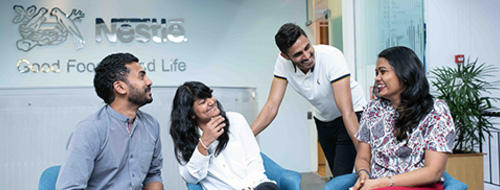Impact Area
- Communities
- Community engagement
- Compliance
- Environmental sustainability
- Gender balance & diversity
- Individuals & Families
- Nutrition
- Planet
- Rural development
- Water
Sri Lanka is currently not producing enough milk to meet its dairy needs and imports the bulk of its dairy requirements, making an essential commodity like milk expensive to the average consumer.
Since milk is a key raw material for Nestlé’s product portfolio in Sri Lanka, the company is involved in developing the local dairy industry to help increase supply and help the country become self-sufficient in milk.
Nestlé has supported the Sri Lankan dairy sector since 1982. Even during the country’s civil war, Nestlé remained active in northern Sri Lanka, operating four chilling centres at the edge of the government-controlled areas which were supplied by collection points further north. In 2010, Nestlé Sri Lanka was able to extend its milk collection to the resettlement areas, providing a stable market and much needed income for those dairy farmers returning to the area.
Supported by the government, Nestlé has set up milk collection districts to provide local dairy farmers with a long-term market for their milk. Today, the company procures over 40 million litres of fresh milk annually from approximately 18,000 dairy farmers.
Nestlé’s dairy development initiatives include:
Training on animal husbandry, environmental and financial training and best practices.
Building capacity via financial assistance, livestock mobile health clinics; and subsidies for artificial insemination, stud bull breeding and high quality pasture plots.
Infrastructure development via milk collection points (to provide farmers living in distant, rural areas easily access to sell their milk) and milk chilling centres (to help farmers keep their milk fresh once it is collected).
The war took away my cattle. Nestlé got them backAruna Bandara - Dairy Farmer
today I not only have a successful dairy business, but I have more time and resources to operate my paddy mill.
Value to society
- Economic opportunities to farmer families in various parts of Sri Lanka.
- Infrastructure investment enabled farmers to store their milk and sell more.
- Supporting farmers who became disabled during the conflict in rebuilding their livelihoods by buying milk on a daily basis, even in small quantities, and assisting them to locate cattle dispersed during the conflict.
- Paying per kg instead of per litre, so that the farmers get paid for every 100g instead of every 250 ml if it were measured in litres.
- Helping Sri Lanka achieve self sufficiency in milk.
- Dairy farmers who lost their relatives and their animals to the war in Sri Lanka are being helped by Nestlé Sri Lanka to rebuild their livelihoods.
- Supported by the government, Nestlé has set up milk collection districts to provide local dairy farmers with a long-term market for their milk.
- Nestlé, which benefits from a reliable supply of local, high-quality fresh milk, also offers a range of microfinance loans to the farmers and also provides them with advice on animal husbandry techniques.
Value to Nestlé
- Increased supply of local fresh milk to meet all of its needs.
- Recognised with a number of accolades and awards from Key Opinion Leaders for its work.
- Profiled by the UNGC as an example of Responsible Business & Investment in High-Risk Areas (for dairy development work particularly in SL former conflict areas).

